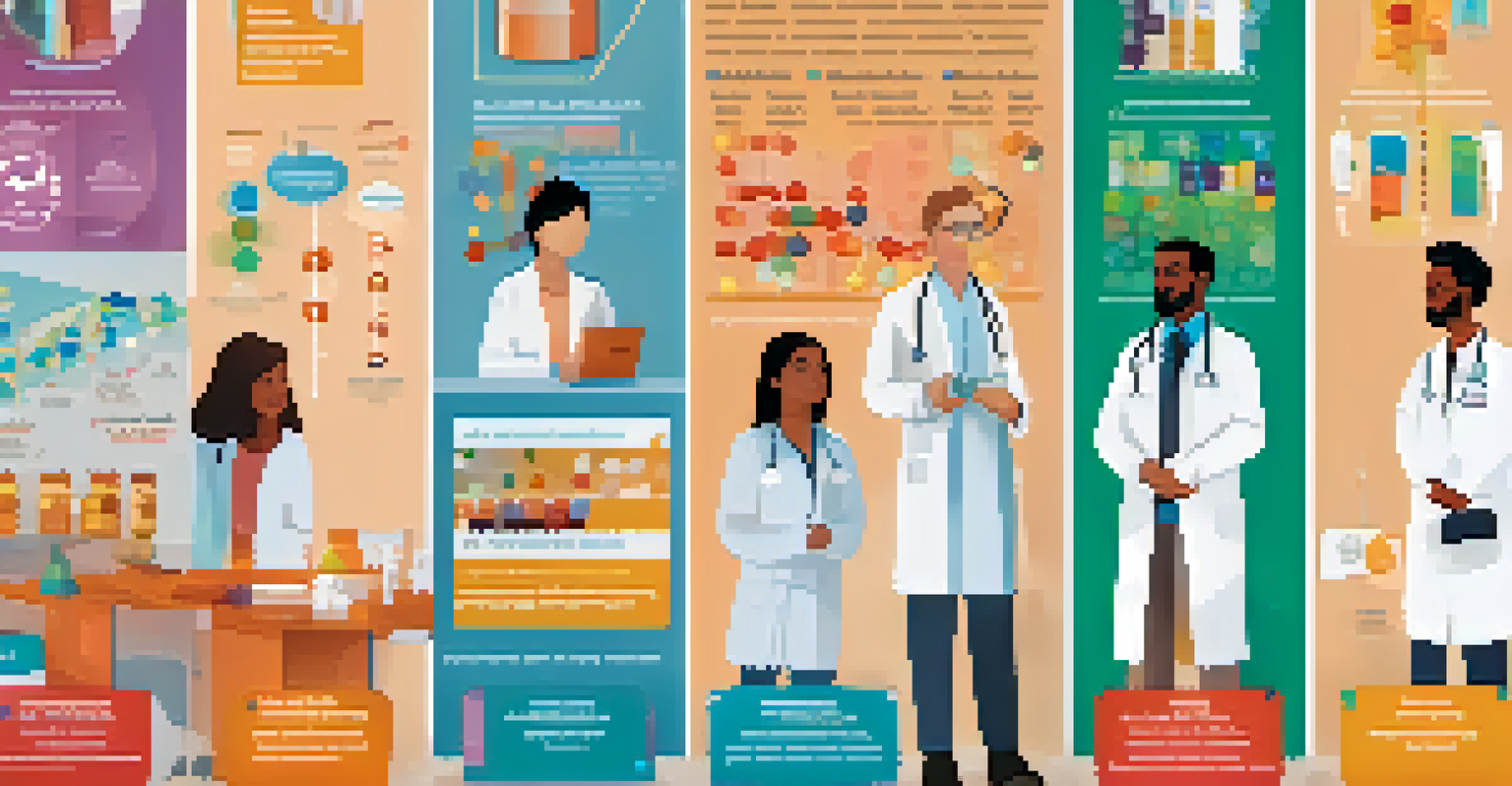Pharmacogenomics: The Key to Personalized Drug Therapy

Understanding Pharmacogenomics and Its Importance
Pharmacogenomics combines pharmacology and genomics to study how genes affect individual responses to drugs. This field aims to customize drug therapies based on a person’s genetic makeup, which can lead to more effective treatments and fewer side effects. Imagine trying on clothes that fit you perfectly instead of relying on one-size-fits-all options; that’s the essence of pharmacogenomics in medicine.
One size does not fit all when it comes to medicine.
The importance of pharmacogenomics lies in its potential to revolutionize healthcare. By understanding the genetic factors that influence drug metabolism, healthcare providers can prescribe medications that are better suited to each patient. This tailored approach not only enhances therapeutic outcomes but also improves patient satisfaction and adherence to treatment plans.
As we delve deeper into pharmacogenomics, it becomes clear that this science is not just about genetics; it's about creating a more personalized healthcare experience. With advancements in technology, we can now analyze genetic variations and predict how a patient will respond to specific medications, ultimately paving the way for a new era of medicine.
How Genetics Influence Drug Response
Genetic variations can significantly impact how individuals metabolize drugs. For instance, some people may process medications quickly, while others may do so more slowly, which can lead to varying effects and side effects. Think of it as a highway with cars moving at different speeds; the same medication can travel through our systems at different rates depending on our genetic makeup.

Enzymes in our body, often influenced by our genes, play a crucial role in drug metabolism. Some individuals may have genetic mutations that alter the function of these enzymes, resulting in ineffective treatment or adverse reactions. For example, a common blood thinner, warfarin, requires careful dosage adjustments based on genetic testing to avoid complications.
Personalized Medicine through Genetics
Pharmacogenomics customizes drug therapies based on an individual's genetic makeup, enhancing treatment effectiveness and reducing side effects.
Understanding these genetic influences allows healthcare providers to adopt a more strategic approach to prescribing medications. By analyzing a patient’s genetic profile, they can predict how that individual will respond to specific drugs, leading to safer and more effective treatment plans.
The Role of Genetic Testing in Pharmacogenomics
Genetic testing serves as the cornerstone of pharmacogenomics, enabling healthcare providers to tailor drug therapies to individual patients. By analyzing a small sample of a patient's DNA, doctors can identify genetic variants that may affect drug metabolism. This process is akin to having a personalized map that guides the most effective treatment route for each patient.
The future of medicine is personalized; it's about treating patients based on their unique genetic makeup.
The results of genetic tests can reveal crucial information about how well a patient may respond to certain drugs. For example, patients with a specific genetic variant may require a lower dose of a medication to achieve the desired therapeutic effect. This targeted approach not only enhances efficacy but also minimizes the risk of side effects, making treatment safer.
As genetic testing becomes more accessible and affordable, its integration into routine healthcare is becoming increasingly common. By incorporating pharmacogenomic testing into the prescribing process, healthcare providers can ensure that their patients receive the most appropriate medications based on their genetic profiles, ultimately improving health outcomes.
Examples of Pharmacogenomic Applications in Medicine
Pharmacogenomics has already made significant strides in various medical fields, including oncology, cardiology, and psychiatry. For instance, in cancer treatment, specific genetic tests can help determine which chemotherapy agents are likely to be the most effective for a patient. This targeted approach not only increases the chances of successful treatment but also spares patients from unnecessary side effects.
Another area where pharmacogenomics shows promise is in the treatment of psychiatric disorders. Medications for conditions like depression or anxiety often have varied effects on individuals. By utilizing genetic testing, doctors can identify which antidepressants may work best for a patient, optimizing their treatment plans and reducing trial-and-error prescribing.
Genetic Testing Enhances Drug Safety
Genetic testing allows healthcare providers to predict patient responses to medications, leading to safer and more efficient treatment plans.
These examples illustrate the power of pharmacogenomics in providing personalized care. As more healthcare professionals recognize the value of genetic insights, we can expect to see an expansion of pharmacogenomic applications across various specialties, ultimately benefiting patients everywhere.
Challenges Facing Pharmacogenomics Implementation
Despite its potential, the widespread adoption of pharmacogenomics faces several challenges. One major hurdle is the lack of awareness and understanding among healthcare providers regarding genetic testing and its implications for patient care. Without proper education and resources, many healthcare professionals may be hesitant to incorporate this innovative approach into their practice.
Another challenge is the integration of pharmacogenomic data into existing healthcare systems. Electronic health records (EHRs) need to be adapted to include genetic information, which requires collaboration among technology developers, healthcare providers, and policymakers. Imagine trying to fit a new puzzle piece into an old puzzle; it takes time and effort to make it work seamlessly.
Additionally, ethical considerations surrounding genetic testing must be addressed. Patients may have concerns about privacy, data security, and potential discrimination based on their genetic information. As we navigate these challenges, it's essential to prioritize transparency and build trust between patients and healthcare providers.
The Future of Pharmacogenomics in Healthcare
Looking ahead, pharmacogenomics holds immense promise for the future of healthcare. As research continues to expand our understanding of the human genome, we can expect to see even more tailored drug therapies that cater to individual needs. This shift towards personalized medicine is not just a trend; it’s becoming an integral part of modern healthcare.
Moreover, advancements in technology, such as artificial intelligence and machine learning, are expected to enhance the analysis of genetic data. These tools can help identify patterns and correlations that may have previously gone unnoticed, leading to more effective treatment strategies. Picture a smart assistant that learns your preferences over time; that’s the potential of technology in pharmacogenomics.
Challenges in Pharmacogenomics Adoption
Widespread implementation of pharmacogenomics faces hurdles, including provider education, data integration, and ethical concerns.
As pharmacogenomics gains traction, it will likely lead to improved patient outcomes, reduced healthcare costs, and a more patient-centered approach to medicine. By embracing this innovative field, we can create a future where treatments are not just effective but also personalized to meet the unique needs of each patient.
Conclusion: Embracing Pharmacogenomics for Better Health
In conclusion, pharmacogenomics represents a transformative shift in how we approach drug therapy. By understanding the genetic factors that influence drug responses, we can move beyond the traditional one-size-fits-all model and embrace a more personalized approach. This change is akin to moving from black and white to vibrant color in our understanding of medicine.
As we continue to uncover the complexities of the human genome, the potential for improved health outcomes becomes increasingly evident. The integration of pharmacogenomics into healthcare not only enhances the efficacy of treatments but also empowers patients to take charge of their health. When patients feel involved in their treatment decisions, it contributes to better adherence and overall satisfaction.

Ultimately, embracing pharmacogenomics is about recognizing the individuality of each patient. By tailoring treatments to their unique genetic profiles, we can pave the way for a brighter, healthier future where medicine truly serves the needs of the people.